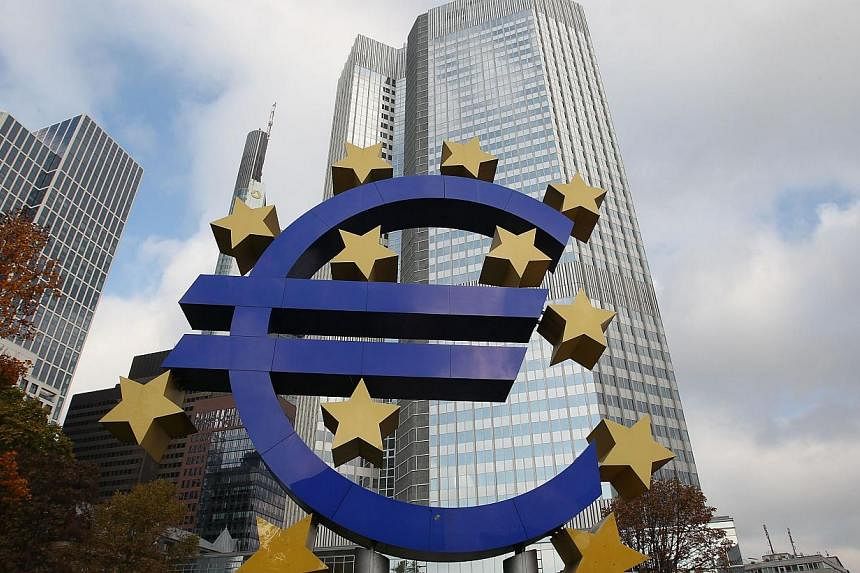1. It's all about the GDP: The economic highight this week is the release on Friday of a raft of third quarter GDP reports from the euro zone, with the currency bloc likely to have stagnated again for a third consecutive quarter.
In the second quarter, the euro zone as a whole grew just 0.1 per cent while its largest economy, Germany, contracted by 0.2 per cent. Another contraction in the third quarter would land Germany in a technical recession i.e. two successive quarters of GDP decline.
Reuters polling has a consensus forecast of 0.1 per cent third quarter growth in the euro zone as a whole and for Germany. France may perform a bit better, growing by 0.2 per cent, while Italy looks set for another contraction. Spain, which has already announced a 0.5 per cent quarterly gain, is likely to be the only bright spot amidst the gloom.
Economists say the latest GDP data should further underline the need for the European Central Bank to stop dithering and get on with quantitative easing. Greater government spending is arguably more likely to have a direct economic impact than monetary policy measures, which are like pushing on a piece of string while demand remains so low, says Capital Economics.
2. Not another G20 "talkfest": Speaking of GDP and dithering, the United States and others are likely to renew their calls on Germany to do more to boost growth when leaders of the G20 economies meet in Australia over Saturday and Sunday.
Australian Prime Minister Tony Abbott vowed on Sunday that the Brisbane Summit will not be a "talkfest" but will focus on the clear goal of creating jobs, identifying tax cheats and boosting the world economy by two per cent over the next five years, bringing "real difference" to people across the world.
Calling it "the most important meeting ever held in Australia", Abbott said all the countries of the G20, including Australia, will be detailing their growth strategies at this summit.
The meeting will be attended by leaders from 20 of the world's biggest developed and emerging economies including US President Barack Obama and Indian Prime Minister Narendra Modi.
3. Eye on the yen: The Japanese currency hovered near a seven-year low versus the US dollar on Friday, having tumbled around 7 yen last week after the Bank of Japan stunned investors by expanding its already massive quantitative easing (QE) programme and boosting a share-buying scheme just after US central bank ended its own huge QE effort.
Japanese cabinet ministers last week expressed concern about the yen's rapid fall, suggesting that Tokyo may be trying to ward off any criticism that it is intentionally devaluing its currency to boost its exporters' competitiveness.
South Korea's President Park Geun-hye and other senior officials have already expressed concerns over the weakening yen. South Korean and Japanese companies often compete head-to-head in the same product groups in global markets, notably cars and electronics goods.
The momentum of the US dollar and the yen dragged Asian currencies lower for a second week but the won was the biggest loser, hitting a 14-month low against greenback on Thursday after Vice Finance Minister Joo Hyung-hwan said the government will manage the currency to make it move in line with weakening yen.
Some traders are betting that the Bank of Korea will cut interest rates to a record low to curb gains in the won versus the yen when policymakers meet on Thursday, even after two recent rate cuts and the risk of more outflow of foreign funds and increasing household debt.
4. Asian GDP out on Friday: We will find out how how much of an impact the ongoing pro-democracy protests had on Hong Kong's economy. Analysts say the economy was showing some signs of improvement before the demonstrations started at the end of September so the third quarter GDP data should show a rebound after the contraction (in quarter on quarter terms) recorded in the second quarter.
The recent weak performance of Malaysia's export sector suggests its third quarter GDP data will show a marked slowdown in the economy. The ringgit hit a nine-month low last week with offshore funds selling the currency amid concerns about lower commodity prices, especialy palm oil.
5. In Singapore, reporting season rolls on: Heavyweights due to announce their quarterly results include Genting Singapore, Wilmar, Olam, SingTel and City Developments. For a glance at the economy, data on retail sales for September is out on Thursday.


